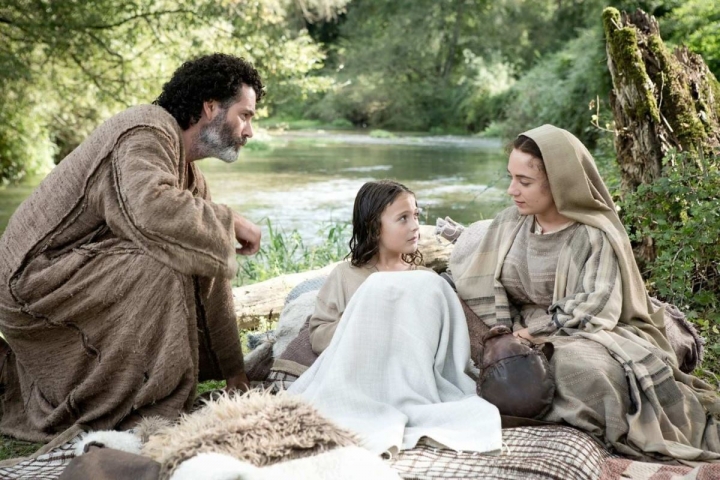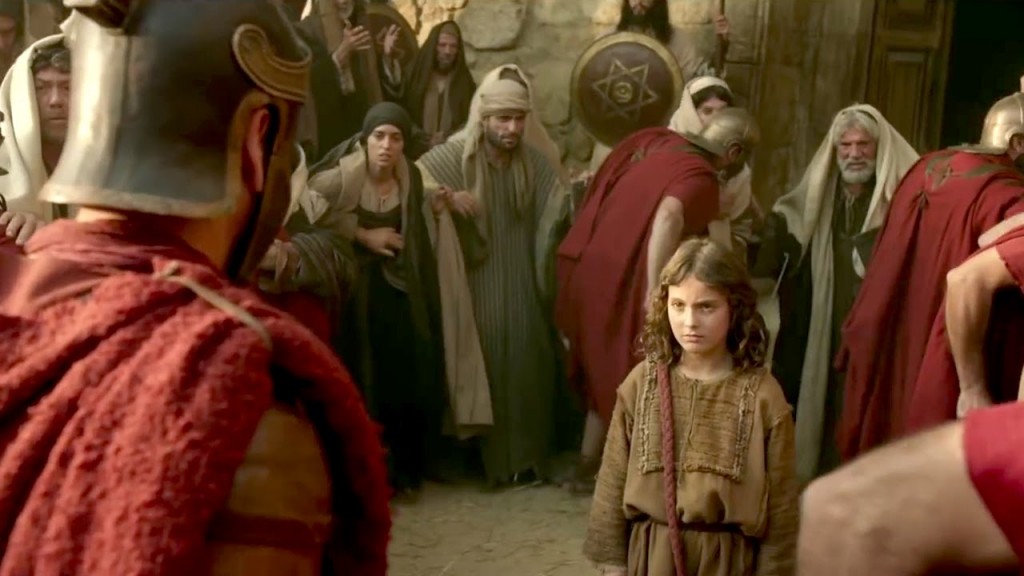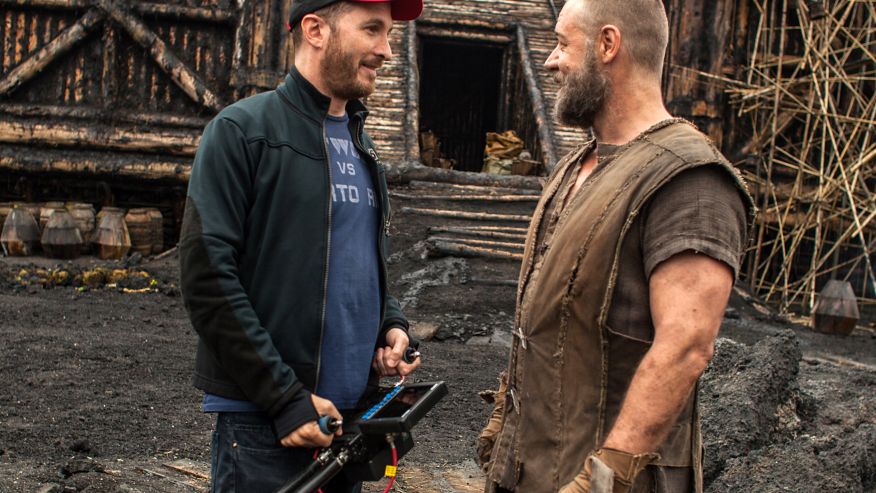What was Jesus’ childhood like? Did he play with friends? Did he ever get sick? What was it like for Mary and Joseph to raise the perfect Son of God? These are all questions that many Christians have pondered and might even discuss from time to time. Wondering about these things helps us relate to Jesus as we know what our personal experiences were like and we like to picture Jesus in our situations.
 The Young Messiah offers a fictional account that seeks to answer many of these questions. When I first saw that this movie would release, I had a twinge of anxiety that people would be offered in the name of truth a false narrative of the childhood of Jesus. The only Biblical historical information that we have of Jesus’ youth is found in Luke 2 where the twelve-year-old boy Jesus is found at the Temple. There are accounts of Jesus’ childhood mentioned in the Gnostic Gospel of Thomas which is widely viewed as heretical and written about two hundred years after Jesus. Therefore when I hear of a movie about Jesus as a child, I am immediately conflicted and concerned. I chose to see this and give this review because I have heard interest from Christians that I love and want to point them to the truth.
The Young Messiah offers a fictional account that seeks to answer many of these questions. When I first saw that this movie would release, I had a twinge of anxiety that people would be offered in the name of truth a false narrative of the childhood of Jesus. The only Biblical historical information that we have of Jesus’ youth is found in Luke 2 where the twelve-year-old boy Jesus is found at the Temple. There are accounts of Jesus’ childhood mentioned in the Gnostic Gospel of Thomas which is widely viewed as heretical and written about two hundred years after Jesus. Therefore when I hear of a movie about Jesus as a child, I am immediately conflicted and concerned. I chose to see this and give this review because I have heard interest from Christians that I love and want to point them to the truth.
First things first. Who is Jesus Christ? Let’s briefly mention the facts from Scripture. Jesus was born to the young virgin Mary who was betrothed to Joseph. She gave birth in Bethlehem and then the family traveled to Egypt at the direction of a messenger of God in a dream. They spent an unspecified amount of his childhood in Egypt before moving back to Israel and settling in Nazareth.
Jesus is the begotten Son of God who is completely God while also being completely man. He lived on this earth some 33 years before being crucified, buried, and then rising again on the third day. He then ministered and bore witness before ascending into Heaven to reign with God the Father.
Jesus was completely perfect. In all of his years, days, hours, and minutes, Jesus never sinned. He didn’t think impure thoughts, he never struggled with pride, he was never selfish or disobedient (not even as a child).
Jesus was Divine and had all of the power of God. There are questions about Jesus’ knowledge of his divinity and the exercising of that power throughout his life. Scripture does tell us that he “emptied” himself (Phil 2:6-7). Luke says, “Jesus grew in wisdom and stature and in favor with God and man (Luke 2:52).” And before Jesus’ ascension he states that “All authority in heaven and on earth has been given to me. (Matthew 28:18)”
Jesus was sent by the Father to redeem a lost world. It was always His purpose and intent to offer Jesus as the perfect blood sacrifice for the atonement of our sins. At the proper time, Jesus was led as “a lamb that is led to the slaughter” to the crucifixion so that sinful man might be saved.
While there are other important truths and doctrinal beliefs concerning Jesus that this film touches on, these are the primary ones that are impacted by this film.
(warning: contains SPOILERS)
SYNOPSIS: The Young Messiah takes us alongside a seven-year-old Jesus for a couple months as his family moves back to the land of Israel. It begins with his family in Alexandria, Egypt and follows them while they move to Nazareth, I srael. Jesus’ family recognizes the opportunity to move back to Israel after the death of Herod the Great and they agree that Nazareth, Joseph’s hometown is the place to settle. Throughout the story, the unrest of the Israelites against the Romans is pervasive. Frequent mention of and crucifixion of “rebels” has a continual impact on the entire story. While the Romans are combating the Jewish rebels, the son of Herod is now paranoid of the prophesied Messiah while playing to the Romans. There is one particular Roman Centurion (Sean Bean) who has been tasked with locating this young Messiah boy and disposing of him. Jesus’ family feels continually threatened by the Roman presence while Jesus is trying to understand his identity and supernatural ability. The movie concludes with the family making the trip from Nazareth to Jerusalem for Passover and ends with a confrontation between the Centurion and Jesus at the Temple.
srael. Jesus’ family recognizes the opportunity to move back to Israel after the death of Herod the Great and they agree that Nazareth, Joseph’s hometown is the place to settle. Throughout the story, the unrest of the Israelites against the Romans is pervasive. Frequent mention of and crucifixion of “rebels” has a continual impact on the entire story. While the Romans are combating the Jewish rebels, the son of Herod is now paranoid of the prophesied Messiah while playing to the Romans. There is one particular Roman Centurion (Sean Bean) who has been tasked with locating this young Messiah boy and disposing of him. Jesus’ family feels continually threatened by the Roman presence while Jesus is trying to understand his identity and supernatural ability. The movie concludes with the family making the trip from Nazareth to Jerusalem for Passover and ends with a confrontation between the Centurion and Jesus at the Temple.
REACTIONS: The movie nicely fit in the historical period. The costumes and backdrop were both appropriate for the region and the ethnicity of the characters seemed to fit. It was not difficult to look past the English accents and imagine that the film really was set in first century Israel. I appreciated the way they treated the Jewish customs. For instance, there was a point where Joseph and his brother-in-law buried a dead man and then did the necessary ritual bathing to be cleansed. All-in-all the movie was not overtly offensive and will be an enjoyable experience for many that see it.
But here is the problem. The flaws of the movie are subtle yet serious. While the film’s portrayal of Jesus may not be overtly offensive, the problems are grave. These errors can easily plant seeds that grow into theological flaws. Every Christian should have a firm and correct understanding of what the Bible says regarding God, the Bible, Jesus Christ, Salvation, and the other core beliefs of our faith.
There are 3 main observations that were problematic concerning a correct view of Jesus Christ in the film.
- Jesus constantly performed miracles in The Young Messiah. The fact that Jesus would be able to do the supernatural is not the problem. But throughout the film, the seven-year-old Jesus raised animals and people from the dead, healed disease, and saw and communicated with Satan. The wedding feast of Cana miracle is called in the Gospel of John “the first of His signs” (John 2:1-12). One might be able to debate whether or not Jesus practiced miracles before this wedding, but it is undeniable that every miracle that Jesus performed was explicitly purposeful in its design to glorify God and teach and point people to Salvation. The young Jesus in this movie not only performs miracles to please his family, but he also seems to not even understand his supernatural ability or know if he’s even doing it. Additionally, his miracles are witnessed by dozens and news of them spread far and wide.This flawed understanding of Jesus and his miracles might lead one to think that they were done out of convenience, selfishness, or even accident. The ministry of Jesus was very intentional with each miracle both glorifying God and pointing people to a better understanding of their place within the Kingdom of God. Jesus was never coerced to perform miracles, as both his cousin and aunt seemed to lead one to believe. Scripture is also very clear that Jesus was very careful and purposeful about the time to reveal his nature through miracles.
- Jesus didn’t know who He was in the film. One of the most peculiar flaws of this movie was that the seven-year-old Jesus seemed unaware of His own person. Not only was he not self-aware concerning his divinity, but also his earthly parents were intentionally withholding his identity from him. Now, one might try to explain away Mary and Joseph’s hesitation concerning Jesus’ true lineage because of their human misunderstanding. But to deny that Jesus himself had a realization even at a very young age of his divine nature is to deny the magnitude of the person of Jesus Christ. It was in his fetal state that his divine nature reached out and announced his deity to John the Baptist. (Luke 1:41).This is not even an amusing speculation to consider Jesus without the knowledge of his divinity. Jesus did not work toward becoming God. He did not go through childhood proving his character and the right to be called the Son of God. It is true that he did “grow in wisdom,” but that does not diminish his own knowledge of his godly identity.
- Jesus allowed someone to lie for him at one point in the movie. In one particular moment in the story, a Roman guard encounters Jesus and asks his name (he is actually looking for Jesus Bar Joseph of Nazareth). The man that Jesus happens to be traveling next to seems to understand the gravity of the situation and tells the guard that Jesus is his boy and has not spoken since birth, an obvious lie. Jesus stands there in complicit silence. This is a perfect example of tacit consent. While Jesus did not utter the lie himself, he agreed with it and did not speak the truth. As Jesus proves at the end of the film, he is perfectly capable of standing in front of opposition with the truth, but why not here?It is improper to even consider the idea that Jesus would be party to a sin. Never in any situation did Jesus commit a thought or an act, actively or passively against the commandments of God.
These were just three of the chief concerns that I had from seeing the movie. And while Christians may be able to see this and be unmoved in their theology (assuming they had a correct theology to begin with), even the slightest possibility that one might be swayed toward an incorrect belief grieves my heart. These subtle errors should not even be given our attention, as Satan would rejoice in sowing doubt concerning the person of Jesus Christ. I would warn against seeing this film. But if you do, please remember that it is completely fiction. One might even conclude that God did not want us to know or speculate on the details of Jesus’ youth and childhood.
(Other specific contradictions with Biblical truth in the film: Jesus saw and talked with Satan (and Satan did not know who Jesus was), Jesus ran away from his family to go to the Temple here at age 7, Jesus occasionally doubted, resisted, and even disobeyed his parents.)




